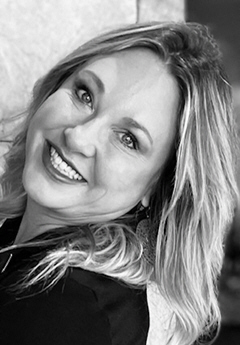CEO Jami talks to MrWeb's Nick Thomas about how she came to be co-founding and growing a data collection business for the 21st century; embracing the tech, but keeping customer service front and center. Taken from the 'Data Visualization' special issue, out now. Available either to read or watch.
Veridata Insights is a global data collection and panel company, and recruitment expert for both qual and quant. The firm is headquartered in Dallas, Texas but is a virtual company with employees worldwide. Jami started it with Tom Littlejohn, now her husband, in 2019.
Watch the video interview or read on for a more or less complete print version.
Parents
JP: I grew up in West Texas. Neither one of my parents graduated from college, and towards the end of their career they were both leaders in multi-billion-dollar organizations, and actually had to hire people that only had college educations. They were able to gain that success by extreme work ethic; positive attitudes, making decisions that were fair for both the company and the teams that they were building; and also, being very stable and creative with how they developed the businesses and the teams around them. I can remember my father saying that there's a solution to everything: sometimes you just have to look a lot harder. He said the same thing about being positive and finding something positive about every situation. And we know with some of the crazy stuff that happens both professionally and personally that sometimes you do have to look really hard to find the positive nuggets in those situations. But be assured it's always there, and you have a good foundation. Veridata is really built on creating solutions with a positive attitude.

My mother was the only executive within her organization - and this was in the 1990s - that didn't live in California, where the company headquarters was located. She kept her home office in Odessa, Texas, and would travel back and forth as needed and she was a phenomenal example of how to work hard... have determination to figure almost anything out... And yes, you can do it all. So, I learned that from a very young age.
NT: What was your parents' actual work?
JP: Well again, in West Texas I'm sure this will be no shock to you, but my dad was in the oil and gas business! My mom actually worked for a cosmetic company which back then was called Jafra and was later bought by Gillette, but it was a direct sales company.
NT: Did they gently encourage you in a particular direction?
JP: I've always had a natural curiosity for the world - learning about different cultures and understanding all the phenomenal things that make this world unique depending on where you go... and it's not that I got a lot of encouragement from my parents in that area, again being in West Texas! I'm the only family member that actually studied abroad - twice - but at the same time when I brought those things to my parents and said, 'Hey I'm really interested in this' they always supported me and encouraged me: 'Hey go! Go learn new things, like it's not our thing, but you should go for it'.
Setting up the company
JP: I spent thirteen years at eRewards, which then became Research Now. Then I left the organization and joined Critical Mix where Tom (Littlejohn) was also. We began working together there and when Critical Mix was acquired by Dynata we both took a step back and said, 'you know we really share a lot of core beliefs and thoughts on how to build a company, how to build successful teams, how to treat employees, how to build a panel and how to treat clients'. So, we created Veridata Insights and in the process because we did have so many core beliefs that were the same, we also ended up getting married! So here we are.
We just celebrated our three-year anniversary this summer, and I'm very proud to say that we have over thirty employees and we're in five different countries. We started off as a virtual organization not knowing that Covid would be hitting us a few months later, but we were already set up with the right strategy and growth plan to still achieve our business objectives, and we had the right people to be able to work through the challenges. So overall, we've had a very successful three years, and we've had zero outside funding. So, we've built the teams and the revenue and the technology from the ground up and those three things will continue to be a focus this year. We will hit double digit revenue numbers and have zero debt, which is something to be proud of. But we've done that through the people, through the sampling solutions and through technology.
Veridata USP
NT: Everybody wants to differentiate their companies - a USP or a particular niche they're trying to grow. So, what were you trying to do that was different to other data collection specialists?

JP: There are a few things. Technology is one: we want to be able to empower our teams more through technology. We built our project management system, Sample Tap, from the ground up to do alerts and operational things, freeing up our project managers to spend more time thinking about the projects. So, we're building a system where they don't have to constantly push the buttons. That way when there's issues, where interviews aren't coming in as we expected, or we're not getting the response rates we thought we would, they can go in and really be problem solvers. And again, they're empowered to make quick and nimble decisions to make sure the clients are happy with the results.
The technology also helps us with sample consistency, so everything is stored within our system. So, if you call me in a year and want to do the same study, you know I can go into our systems very easily and go, okay, we need to keep the sample mix the same and our system allows us to do that.
Since the inception of Veridata, we aim to get technology to do the basics and allow people to be the thinkers and to focus on the more complex parts of the business. And so, we're in the process of building a CRM system on top of our project management system. It was the best way to do it from both the timing and monetary standpoint, it takes a ton out of the double entry, which as you know does create an opportunity for human error. And then once that project is complete, it's notified in the project management system, then it will automatically be sent over to our financial system which will then invoice the client - and if we have partners on the project it will set up the partners for invoicing and for payment as well.
Data Usage Offering
NT: I've read that you offer to clients to go into their existing data and to help them work with that and sort out what they have and analyse that?
JP: Over the last ten years companies have become a lot more aware of all the information that they have in their internal organizations, and one of the challenges is they don't know how to use it, or organise it where it's useful, so depending on what the company needs are it might be as easy just going in and taking the data and creating custom dashboards, or creating knowledge centres. A really good example is very early on in my career, I can remember Microsoft being one of our largest clients and we would do the same project for multiple offices across Microsoft because they didn't have access to all the data and all the studies that they were doing globally, and now with knowledge centres and dashboards you know that can be fixed.
NT: Where do you get the expertise for that - is that distinct people who know about dashboards and things within the company, or are all the staff people who do everything?
JP: You definitely need experts in that industry, right, because some of it deals with data visualization, some of it is making sure that you take out the noise, defining what information is useful, what information is nice to know, and then really creating clear objectives across the different teams that are going to have access to it. We have data experts that are much smarter than me, that will go in and make sure that we clearly define what our objectives are, and then how to organise it and do the data visualization or create the knowledge centre so it's useful and powerful - sometimes across the globe with different offices and regions.
NT: Did you bring people on board to do that after you started the company - was that a more recent development to launch that?
JP: I would say we had a network with people and contractors and experts in that industry since the very beginning, we've had relationships with them for ten plus years - they've helped us with various projects whether it's data visualization, knowledge centres, custom dashboards or whatever, so we basically brought those relationships [in-house] - that part was very seamless.

Technology and Hard-to-reach Respondents
NT: In those cases where you've got a large but hard to reach audience to find, how does technology help you?
JP: The technology expands over fifteen to twenty different social media groups - we're recruiting through WhatsApp, Instagram, Twitter, Facebook, the list goes on. Basically, we can target on over five thousand different variables for this type of recruitment, and the way that we do it wasn't even possible five or six years ago, not at this level, because you're using technology to make it scalable to have a wide range of all of these different social media groups.
NT: ...and at the other end of the scale, when it's a very small number of target individuals, I assume that's when it makes sense to have manual input to it, to have people working to find just a few?
JP: Correct.
Customer Service
NT: A broader issue now: I know you pride yourselves on offering considerably better customer service than the average data collection company. How do you define that and how are you able to make the customer service much better?
JP: Great question. There are a few things.

1. We train people to provide proactive communication - and if we ever see a client coming to us asking us questions about like hey, what's the sample plan or hey, what's the next steps, that's always a red flag. We should be proactively communicating where we are with the project and what our plan is.
2. Creating systems internally that allow our project managers to still manage several projects at one time, but then also to remain focused on the challenges and to create solutions to those challenges. That has been extremely helpful from an efficiency standpoint.
3. Ensuring that we're empowering our employees, you know, they don't have to go ask fifteen different people on how to switch up the same plan to get to an audience that we're having issues with. They can look at it. They've been doing this for eight years plus and they can say 'here are some other ways that we can sample and get to and target this organisation or these people, let's do it'. So that allows them to be very nimble and quick versus having to work up fifteen different decision-making channels and never really getting an answer.
NT: Do your clients themselves have access to your systems? Can they keep track of their projects via some sort of online portal?
JP: Not now. So that is one of the things that we're working on. When our sample management system is at its fullest and reaches its full capability, our clients will be able to go in and basically have a project view: here's Project X, here's how many completes we need, here's what we're seeing, here's the incidence, here's the expected out of field day - if they wanted to pull the data they could. We're working on that user interface.
NT: Can you pick for me a recent project that you've worked on, of which you're particularly proud, where you've managed to do something revolutionary or different for a client and tell me about it?
JP: A global AATD caregiver recruit. Our client communicated to us that we were one of the only companies that provided a full solution, and it wasn't on a 'best efforts' basis. We went into the different countries, went very manually into the patient support and advocate groups - and once we were able to get one or two recruits per geo, we then implemented a refer a friend program to be able to hit the number of recruits in the different countries we were going after. The client was ecstatic that we were able to do that on time, on budget and get the number of recruits we committed to. I think when you're one of the only companies that provides a quote - that says, hey, we can do this - a client is naturally very hesitant about how it's going to turn out, but again, they were ecstatic with the results.

The Future
NT: What are the new developments that are really changing research, on your side of it?
JP: For my opinion, the marketing research industry has never been quick to adapt to new technology and to new recruitment methodologies. I can remember working way back when Greenfield and Ciao were the only online panels and everybody was in uproar, like, 'We don't know about the quality, the biases. We don't know if these people are who they say they are' - so it's taken a really long time for the industry to transition to that. I think we have to be very open about the new technology, the different groups out there, the different audiences and be open to finding these people where they naturally live, breathe and exist and getting them to participate in marketing research. And again, that's done through real-time recruitment and validation. And I think as that gets better and more powerful, I don't know if we will always have the need for these extremely large global panels. But I think we have to be comfortable with surveying people in their natural state. A really good example is that we still work with a lot of companies where their surveys aren't mobile-friendly, and yet they really want to get to the eighteen to twenty-four-year-old age groups or have sub quotas, oversampling for African Americans or Hispanics, and the issue is that our social media recruitment traffic is eighty percent mobile, so we have to be better as an industry at making sure our questionnaires are designed and compatible with how our business professionals or consumers want to talk to us and give us data.
NT: If a client isn't ready for a mobile survey, do you have to push them down that route - to tell them it's impossible without it?
JP: It depends on the sample size and the Geo, right? The smaller the sample size, the less creative you have to get. So, it really just depends. But we're very honest and we always provide that feedback - we even make the offer to our clients, 'If you send us the questionnaire and you're open to it, let us take a look at it and see if there's some things that we could do to make this mobile friendly'.
NT: Still looking at the future, do you think it's going to get more difficult to remain a company focused on data collection?
JP: Maybe, if you're not open-minded about learning about the different techs, you know, and the different modes of communication that people want to speak to us through, I think it's going to be extremely difficult. If you look at the marketplace and even with online panels, we're fighting for the time and engagement for people to continue to participate in research. Think about yourself, how many hours are you in front of your phone, your computer? How many things do you do on a daily basis? I mean hundreds, right? And so, we're fighting for that time and attention for people to participate in research. I think that part of the industry has gotten really used to very cheap and very fast sample, and I really believe there's a time and place for everything, depending on the research objective and the audience and whatever. But I do think that we're going to have to be open-minded - maybe a little bit longer timelines - and more expensive sample, when we have the need to pay higher incentives to engage some of these harder to reach audiences.
NT: There's a point of view that survey research per se is a shrinking niche, and to do well in it, you're fighting for a larger share of a smaller niche, to survive. Do you share that view?
JP: Yes, I do think that's true. But I also think that as we get better at things like the behavioral data - which is really good at telling you what people do (I love that because it's not self-reported data and a lot of times people aren't trying to lie through surveys but they truly can't remember) - there will always be a need because that answers what people are doing, but we still have to understand why people do it and what are those motivations. So, I think there's going to be a balance, and a need for understanding what that balance is and how much information you could get through passive data versus ad hoc data.
Motto
JP: For a company that's been around for such a short amount of time, we have several. So, some of our favorites, that we live by, are things like 'make it happen', 'No isn't an answer', 'Work hard, play hard' and 'continuous improvement is mandatory'. Personally speaking, I like 'find the solution' and 'continuous improvement' - and the latter also includes making sure you're learning about different technologies and different recruitment methodologies, testing them, and learning about them, and being open to change.
[end]
All articles 2006-23 written and edited by Mel Crowther and/or Nick Thomas, 2024- by Nick Thomas, unless otherwise stated.
Register (free) for Daily Research News
REGISTER FOR NEWS EMAILS
To receive (free) news headlines by email, please register online